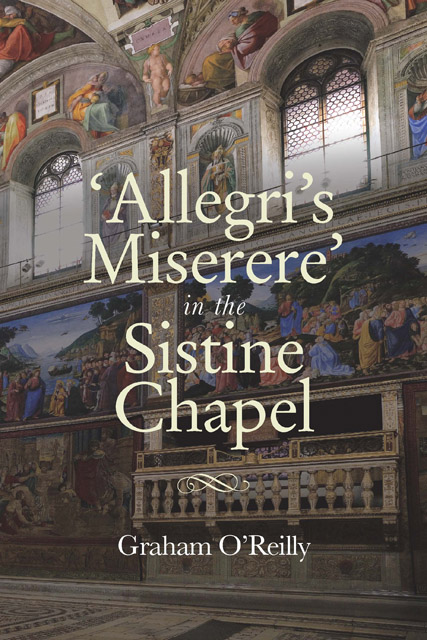Book contents
- Frontmatter
- Contents
- List of illustrations
- List of tables
- List of music examples
- Acknowledgments
- Note on the text
- Introduction: myth and reality
- Part One The Sixteenth and Seventeenth Centuries
- Part Two The Eighteenth Century
- Part Three The Nineteenth Century
- Part Four Performing the Miserere in the Twentieth Century
- Part Five Appendices, Editions and Notes
- List of appendices
- Bibliography
- Index
10 - Nineteenth-century sources 2 – Alfieri’s Il Salmo Miserere of 1840
Published online by Cambridge University Press: 13 January 2023
- Frontmatter
- Contents
- List of illustrations
- List of tables
- List of music examples
- Acknowledgments
- Note on the text
- Introduction: myth and reality
- Part One The Sixteenth and Seventeenth Centuries
- Part Two The Eighteenth Century
- Part Three The Nineteenth Century
- Part Four Performing the Miserere in the Twentieth Century
- Part Five Appendices, Editions and Notes
- List of appendices
- Bibliography
- Index
Summary
A ‘secret’ publication
After Burney’s publication of 1771, there was no new edition of the Miserere until 1838, when the Paris publication (described in Chapter 6) briefly appeared. But the next was not long in coming. In 1840 the Vatican publisher Pietro Alfieri (1801–63) issued Il Salmo Miserere posto in musica da Gregorio Allegri e da Tommaso Bai, Publicato cogli Abbellimenti per la prima volta. It is significant because it is the only one by a Roman editor, although Alfieri published it ‘incognito’ under the name of Alessandro Geminiani, and in Lugano, Switzerland, rather than in Rome.
Perhaps he doubted that permission for it would be given by the Vatican authorities, and so decided to pre-empt their refusal. It seems he was right. The following year, perhaps ill at ease with his subterfuge, he asked to be allowed to publish in Rome. In a modified preface he attempted to argue precedent, as well as repeating the argument already made in his Lugano publication concerning the need for explanations.
Publications similar to these were made last century by Dr Charles Burney in England, together with all the other pieces sung in the Apostolic Chapel during Holy Week, since they were given to him by a certain Giuseppe Santarelli, soprano of the said Chapel. But now, since copies can no longer be found, and imprecise copies are circulating in divers parts of the world, and [which are] deprived of the necessary clarifications, I thought it would be good to republish them with the greatest diligence.
As Alfieri must have expected, the authorities immediately showed the projected publication to Baini, who did not mince his words in his reply to Padre Domenico Buttaoni, Master of Ceremonies of the Apostolic Palace.
The two Misereres in the Pontifical Chapel, of whose renown everyone is familiar, had always been jealously guarded in the Chapel archive. A castrato, G. Santarelli, found the means of copying them secretly and sold them to an English Jew, C. Burney, who immediately had them printed in London for huge profit. This betrayal greatly displeased Rome, and it even displeased the Pontiff himself – Clement XIII – who, if he hadn’t been prevented by dying, would have given Santarelli the punishment he deserved. From that day until now all music publishers sell either in print or lithograph or manuscript the two aforementioned Misereres.
- Type
- Chapter
- Information
- Allegri's Miserere in the Sistine Chapel , pp. 147 - 162Publisher: Boydell & BrewerPrint publication year: 2020

